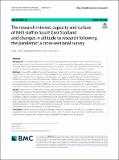The research interest, capacity and culture of NHS staff in South East Scotland and changes in attitude to research following the pandemic : a cross-sectional survey
Abstract
Background The UK National Health Service (NHS) is ideally placed to undertake research. The UK Government recently launched its vision of research within the NHS to improve research culture and activity amongst its staff. Currently, little is known about the research interest, capacity and culture of staff in one Health Board in South East Scotland and how their attitudes to research may have changed as a result of the SARS-CoV-2 pandemic. Methods We used the validated Research Capacity and Culture tool in an online survey of staff working in one Health Board in South East Scotland to explore attitudes to research at the organisation, team and individual level together with involvement in, barriers to and motivators to engage in research. Questions included changes in attitude to research as a result of the pandemic. Staff were identified by professional group: nurses/midwives, medical/dental, allied health professionals (AHP), other therapeutic and administrative roles. Median scores and interquartile ranges were reported and differences between groups assessed using the Chi-square and Kruskal-Wallis tests with P < 0.05 accepted as statistical significance. Free-text entries were analysed using content analysis. Results Replies were received from 503/9145 potential respondents (5.5% response), of these 278 (3.0% response) completed all sections of the questionnaire. Differences between groups were noted in the proportions of those with research as part of their role (P = 0.012) and in being research-active (P < 0.001). Respondents reported high scores for promoting evidence-based practice and for finding and critically reviewing literature. Low scores were returned for preparing reports and securing grants. Overall, medical and other therapeutic staff reported higher levels of practical skills compared with other groups. Principal barriers to research were pressure of clinical work and lack of time, backfill and funds. 171/503 (34%) had changed their attitude to research as a result of the pandemic with 92% of 205 respondents more likely to volunteer for a study themselves. Conclusion We found a positive change in attitude to research arising from the SARS-CoV-2 pandemic. Research engagement may increase after addressing the barriers cited. The present results provide a baseline against which future initiatives introduced to increase research capability and capacity may be assessed.
Citation
Chinn , D J , Pribanova , M & Quirk , F 2023 , ' The research interest, capacity and culture of NHS staff in South East Scotland and changes in attitude to research following the pandemic : a cross-sectional survey ' , BMC Health Services Research , vol. 23 , 220 . https://doi.org/10.1186/s12913-023-09196-y
Publication
BMC Health Services Research
Status
Peer reviewed
ISSN
1472-6963Type
Journal article
Description
Funding: NHS Fife, Research, Innovation and Knowledge Department sponsored and funded the project.Collections
Items in the St Andrews Research Repository are protected by copyright, with all rights reserved, unless otherwise indicated.
Related items
Showing items related by title, author, creator and subject.
-
Editorial introduction: Social and spatial inequalities in health and mortality : the analysis of longitudinal register data from selected European countries
Keenan, Katherine Lisa; Kulu, Hill; Cox, Fiona McLean (2022-04-08) - Journal itemHealth inequalities—systematic differences in health outcomes between social groups and across spatial units—are ubiquitous, but not necessarily inevitable. They are the product of a complex interplay of social and economic ... -
Angle-resolved photoemission studies of uniaxial stress-driven Lifshitz transitions in the bulk and surface electronic structure of Sr₂RuO₄
Abarca Morales, Edgar (2023-11-29) - ThesisIn experimental condensed matter physics, the utilisation of momentum-resolved probes has proven valuable in disentangling the underpinning effects driving the formation of rich collective states in quantum materials. ... -
Re-thinking residential mobility : linking lives through time and space
Coulter, Rory; Van Ham, Maarten; Findlay, Allan MacKay (2016-06-01) - Journal articleWhile researchers are increasingly re-conceptualizing international migration, far less attention has been devoted to re-thinking short-distance residential mobility and immobility. In this paper we harness the life course ...

